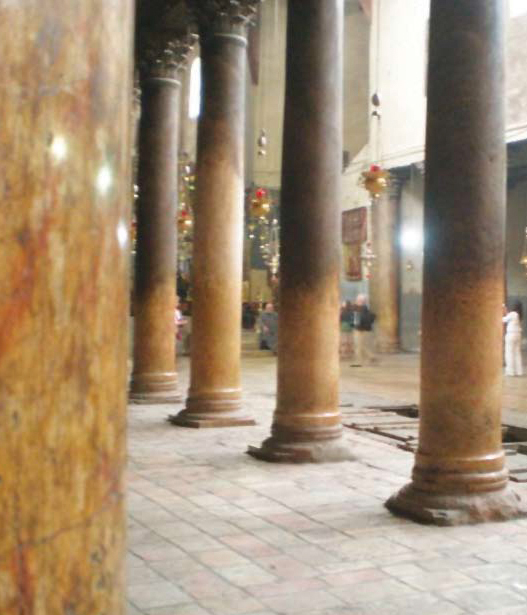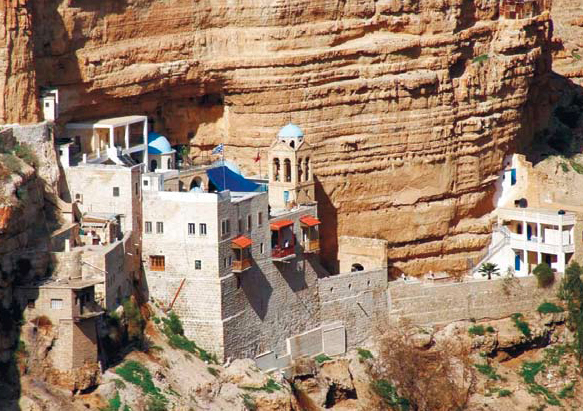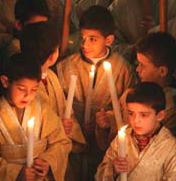Etiska regler
för resande i Det heliga landet
The establishment of just and responsible tourism for Palestine and Palestinians requires
an understanding of political context and history, for it is these that set the constraints
and barriers within which Palestinian tourism has to operate. The Code addresses these
directly - and, by doing so, attempts to overcome them.
The Context of Palestine
 Palestine is a unique tourist destination - its long history, religious significance and
natural beauty make it an amazing place to visit. Palestine's importance derives partly
from the fact that it is home to the three monotheistic and Abrahamic religions of Judaism,
Christianity, and Islam. Every year it attracts many pilgrims, people of faith and scholars
who visit the holy places. Secular tourists come to explore the historical sites, Palestine's
vibrant cities, rural life and nature reserves.
Palestine is a unique tourist destination - its long history, religious significance and
natural beauty make it an amazing place to visit. Palestine's importance derives partly
from the fact that it is home to the three monotheistic and Abrahamic religions of Judaism,
Christianity, and Islam. Every year it attracts many pilgrims, people of faith and scholars
who visit the holy places. Secular tourists come to explore the historical sites, Palestine's
vibrant cities, rural life and nature reserves.
However, since the beginning of the 20th century Palestine has seen complicated changes
in its political circumstances. These have included the creation of Israel in 1948 and
the 1967 war. As a result of the latter, Israel occupied the West Bank, including East
Jerusalem and the Gaza Strip. These events have created catastrophic political, economic
and social facts which have deeply affected the life of the Palestinian people, most of
whom became refugees. In many ways Palestine itself was simply wiped off the map, historic
Palestine coming to be known as Israel. In this context tourism became a political tool
in the supremacy and domination of the Israeli establishment over land and people, and
an instrument for preventing the Palestinians from enjoying the benefits and the fruits
of the cultural and human interaction on which tourism thrives. Despite the fact that
Israel signed the Oslo Agreements with the PLO in the 1990s and recognised the
establishment of the Palestinian Authority to administer some of the Palestinian
territories, namely the West Bank and Gaza Strip, many areas of life in those areas
are still under Israeli control. For example, Israel controls all access to
Palestine (land and sea borders as well as access from the airport), most of the
Palestinian water resources, and all movement of people and goods from, to and within
Palestine. These facts have significant impacts on the development of tourism in the
Palestinian territories and the dissemination of information to tourists. Jerusalem
- the heart of tourism in the region - has been illegally annexed to Israel,
filled with illegal settlements, besieged, surrounded by checkpoints, and encircled
by the Apartheid Wall, all of which has resulted in the city's isolation from its
social and geographical surroundings.

Despite all this, the touristic, historic, and holy places found in Israel and the Palestinian
territories are united. They cannot be separated from each other. In this regard what we
are asking tourists to do is to visit both Israel and Palestine rather than choose to visit
just one or the other. This is the route towards more fairness and justice.
Det är givande att resa rättvist
Tourism in Palestine provides visitors with a particularly rewarding and enriching
experience. Not only may the tourist discover the beauty, spirituality and hospitality
of the country but also come to encounter some of the political, economic, and social
facts on the ground that shape the daily lives of Palestinians. This is as it should be
for much can be gained - both by tourists and by their Palestinian hosts - from a proper
relationship between the two. Too often the contact is very slight, consisting of rapid,
coach driven visits to the Nativity church in Bethlehem (with a souvenir shop on the way)
- a style of tourism that derives from the fact that much of the itinerary is controlled by
Israel and the processes of the Israeli tourism industry. Our Code, on the other hand,
seeks to contribute to a more general effort to re-engage the tourist with Palestinian
land and people in
 such a way that will benefit local communities, reduce over exploitation
of a small number of iconic sites, and also reduce the pollution that results from coach
driven mass tourism in the Palestinian towns and cities (especially Bethlehem).
such a way that will benefit local communities, reduce over exploitation
of a small number of iconic sites, and also reduce the pollution that results from coach
driven mass tourism in the Palestinian towns and cities (especially Bethlehem).
Therefore, we urge you, the tourist, to consider visiting the Palestinian cities, towns and
villages and to allow time for encounters with the population living in these places.
We believe that in this way, tourism will realise its potential for both you and us.
At the same time, we call on the local community to interact positively and in a respectful
way with pilgrims and tourists, and to renounce small-mindedness and exploitation of visitors.
We should all remember that visits by tourists to the country are an opportunity for
cultural, social and human exchange.
Här kan du ladda ner foldern med etiska regler för resande i Det heliga landet
A Code of Conduct for Tourism in the Holy Land på engelska.
Och här endast texten A Code of Conduct for
Tourism in the Holy Land på engelska.
|
copyright © ATG (Alternative Tourism Group) Sverige
|